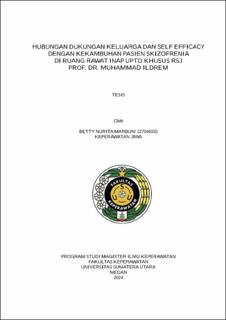Hubungan Dukungan Keluarga dan Self Efficacy dengan Kekambuhan Pasien Skizofrenia di Ruang Rawat Inap UPTD Khusus RSJ Prof. Dr. Muhammad Ildrem
The Relationship of Family Support and Self Efficacy with Recurrence of Schizophrenia Patients in the Special UPTD Inpatient Room of Prof. Dr. M. Ildrem Mental Hospital

Date
2024Author
Marbun, Betty Nurita
Advisor(s)
Nasution, Siti Saidah
Daulay, Wardiyah
Metadata
Show full item recordAbstract
Family self-efficacy coupled with low trust causes schizophrenia patients to experience
relapse. Schizophrenia is one of the severe and chronic mental disorders (psychotic) which is
a burden on families because of frequent relapses. People with schizophrenia seek re-treatment
in inpatient and outpatient care in 2021, namely 435 people, increasing to 437 people in 2022
and increasing to 521 people in 2023 in the Special UPTD of Prof. Dr. Muhammad Ildrem
Mental Hospital. The research objective is the relationship between family support and selfefficacy
with the relapse of schizophrenia patients. Type of quantitative research crosssectional
approach. The population is the family of schizophrenia patients getting treatment
for 3 months in the inpatient room 365 people and a total sample of 68 people with accidental
sampling technique with paranoid inclusion criteria. The data were analyzed using the chi
square test. The results of the study of family support for paranoid schizophrenia patients were
more unsupportive 63.2% and families had low self-efficacy 60.3%. Paranoid schizophrenia
patients experienced a relapse of the disease 66.2% by experiencing symptoms of less ability
to care for themselves 20 people, unclear speech, whining, crying and talking to themselves 19
people, disturbed sleep activity and unable to behave according to norms 18 people. There is
a relationship between family support and self-efficacy with the relapse of schizophrenia
patients, each p value (0.007; 0.005). Families can provide support to schizophrenia patients,
especially in increasing knowledge, creating a comfortable and conducive family environment,
activating psychoeducational multi family groups and regularly visiting the hospital to get
information or counseling.
Collections
- Master Theses [486]
